Thomas Bantock
|
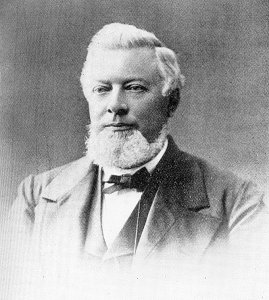
Thomas Bantock. |
The second remarkable personality, Thomas Bantock,
whom James Bradshaw must have known, was in the house by 1867.
The life of Thomas could be the plot of a Victorian novel:
bright boy, too poor to complete his education, so impresses his
employers that he is transferred to a distant town where,
sustained by his religion, he is able not only to thrive himself
but to serve his community and die honoured by it.
Thomas Bantock was born in 1823 in the little village of
Golspie near Inverness, the son of Benjamin Bantock, a
gamekeeper. Though a prize-winning schoolboy, he left school at
16. |
He was taken into the employ of the Trustees of the Duke
of Bridgewater, who had large interests in collieries and canals.
Perhaps it was in connection with the nearby Caledonian canal, which had
recently been built by Telford and opened in 1822 but closed for
extensive repair from 1843 to 1847, that Bantock gained his employment.
Whatever the case, he was sent to Wolverhampton as an agent of the
Trustees in 1849 at the age of 26. Here he soon saw that the transport
of goods in the future would be by railway and that the canal traffic
was bound to decline. By 1858 he had a valuable contract in his own
right with the Great Western Railway. By 1861 he was the Trustees'
district agent, though he also worked for the Great Western Railway.
He then set up in business as Thomas Bantock & Company,
resigning thereby from his former employers. In his own right he became
an ironmaster, mined coal at Springvale in Bilston and built boats and
wagons at Millfields, Ettingshall. It was as head of Thomas Bantock &
Co. that he escorted Queen Victoria on her visit to the town in 1866.
He had strong Christian principles which led him into
politics as a Liberal and he was elected in 1861 to represent St Mary's
Ward, which was one of the poorest areas of the Town. He served this
ward for 33 years.
| Thomas was liberal in his politics and a devoted
free churchman in his religion - he belonged to Queen Street
Congregational Church. So he was the "wrong" sort of Christian,
which his supporters thought the reason why he was not a JP until
after 1887.
He belonged to a group of men from Queen Street Congregational
Church who thought that their children were at a disadvantage in
education and in 1862 they formed Tettenhall College as a school
for able sons of men with slender means. |
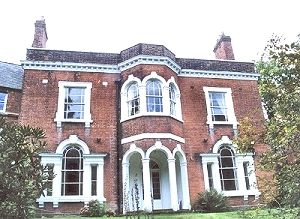
The original building bought by the College
trustees, in College Road, Tettenhall.
|
In 1867 he contributed generously to the rebuilding of
Queen Street Church on the site of the old one. This was a fine
commodious building designed by George Bidlake. By now Bantock had the
means to move into Merridale House which he eventually purchased from
the Petits.
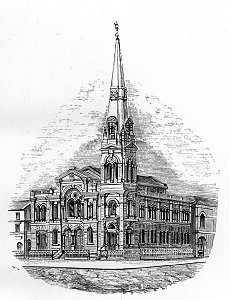
Queen Street Congregational Church. |
Bantock's political career had its challenges. In
1869 he was proposed as Mayor by Alderman Underhill and was to have
been seconded by Sir John Morris. Morris had in the meanwhile
learned that not only was Bantock the wrong sort of Christian, he
intended to hold the Mayor's Sunday Service at his own Church and
not at St Peter's Church of England. This was hardly surprising,
since Bantock was a Scotsman, a Presbyterian and the Senior Deacon
in a brand new and splendid town centre church. His Tory opponents
saw a chance to bar him, claiming "ancient custom" and he had to
wait in another room whilst the matter was thrashed out.
The
Wolverhampton Chronicle reports the uproar in detail. Thomas, of
course, thought he was out of the room as a formality, expecting to
be called in a few minutes for warm congratulation. He was dismayed,
when he eventually came into the room, that the matter should have
created such dissension. |
But the "ancient custom" had been shown to be no more
than seven years old and it had been recalled that a Catholic mayor had
never entered St Peter's. Bantock had been elected and his position as
Mayor was secure.
| During his year of office Wolverhampton was one of
the first towns to implement the Education Act of 1870. This was
despite concern in the papers "that working men will get into the
Town Council" and a prophecy of revolution! In the same year the
Free Library was started in the town and weekly issues reached 2,000
per week and in 9 months borrowings totalled 58,251. Only three
books had been lost, 18 damaged, and total fines were £29 16s 7d
"which with slight exceptions had been cheerfully paid". |
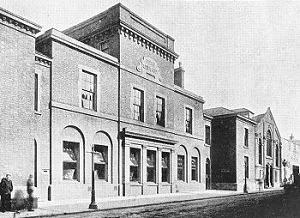
The Free Library in Garrick Street.
|
As mayor Thomas Bantock showed both compassion and common
sense. The weather in the first few months of 1870 was frosty so that
many of the poor were unable to work. From his own pocket he paid for
oatmeal and bread to relieve immediate distress and he persuaded his
fellow councillors to "aid him by liberal subscription to the fund
raised for the purpose".
Presiding over the Police court he heard the case against
"a person summoned for riding a bicycle in the Cleveland Road". It was
claimed that such swift and silent movement was likely to frighten
horses and knock down unwary pedestrians. He dismissed the summons
saying that the inhabitants "had as much right to ride the bicycle as
they had to ride on horseback or to ride in a carriage - the road was
for all". And that, as a contemporary wrote, settled the matter as far
as Wolverhampton was concerned.
|
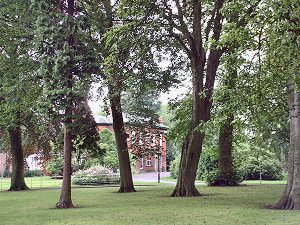
Bantock House from the park. |
Thomas had married Mary Anne Dickenson in 1852 and
by the time of the move to Merridale House had ten children, three
sons and seven daughters, the oldest fourteen year old Mary Janet
and the youngest baby Walter Thomas. The girls stayed at home till
marriage, and helped their parents' entertaining with songs and
piano pieces. Their father kept in touch with his first home through
life membership of the Edinburgh and London Sutherland Societies,
contributing generously to charities there, particularly those to do
with education. |
He died on 20th July 1895 and was remembered as
"invariably found honourable, straightforward and honest in all his
transactions".

|
Return to
the
previous page |
|

